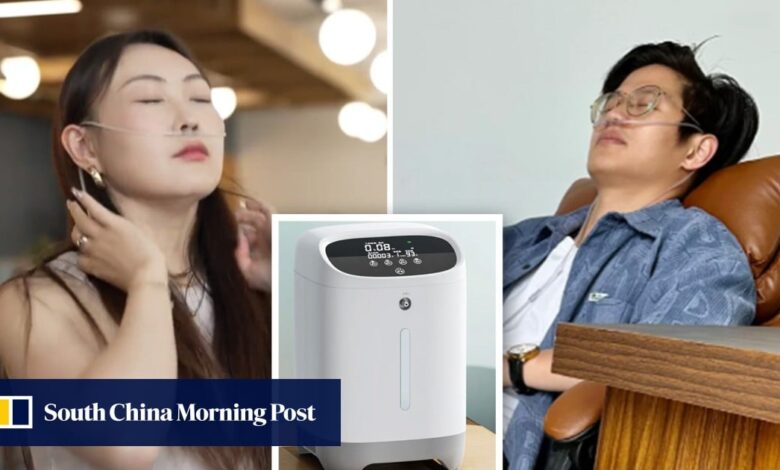No coffee, oxygen please: health warning as young in China turn to ‘performance enhancing’ inhalers in bid to climb ladder of success

[ad_1]
Young people in China are using oxygen inhalers to boost their capacity for work and study in the face of relentless pressure to excel.
The extent of the phenomenon is illustrated by the fact that a topic titled “Oxygen is more useful than coffee” began trending on the social media platform Xiaohongshu on September 10, attracting more than 5.6 million views.
A 26-year-old account holder on the platform called @Zhimali posted a photo of herself using a portable oxygen machine in her office and said she bought it to keep up with colleagues who work until 11pm every night.
The product manager, from Hunan province in central China, said she inhaled oxygen during the lunch break, and sometimes while working, to help her focus and stay creative.
According to @Zhimali, a positive side effect is that her boss pushes her less after seeing her inhaling oxygen at work.

A 21-year-old university student called @Biqibaodiyizhangyumei on Xiaohongshu said she used the oxygen inhaler to clear her mind when she feels sleepy during study. It was a good substitute for coffee, which often raised her heart rate sharply, she said.
“Inhaling oxygen is more like a placebo, a gesture seeking joy amid sorrow. I have no intention to cause nei juan,” the university student said, using a phrase that has become popular online in recent years.
Nei juan, or involution, refers to the process of putting additional effort into an endeavour to get ahead but seeing no discernible results.
It has been used to illustrate the 996 work culture, in which employees are required to work from 9am to 9pm six days a week. The expression also refers to so-called “chicken blood parents” who push their children to ensure academic competitiveness.
Pure oxygen is advertised for the elderly and pregnant women as well as able-bodied people travelling to high altitudes and engaging in study or work.
A one-litre bottle, which lasts less than 10 minutes, costs about 10 yuan (US$1.40) on the mainland’s e-commerce platform Taobao, whose parent company, Alibaba, owns the South China Morning Post.
But not everyone is pleased with the development. Some consider the practice pointless, or even counterproductive.

One person responded to @Biqibaodiyizhangyumei’s post and said: “Even donkeys can take a break after getting tired from work, and now people are paying for the air we breathe naturally.”
Another online observer advised against the practice, warning that a reliance on oxygen bottles would be unhealthy in the long run.
Respirologist, Mou Xiandong, at Beijing Tsinghua Changgeng Hospital told the Science and Technology Daily that able-bodied people could suffer from lung damage or oxygen poisoning, which can lead to breathing problems and even death in serious cases.
[ad_2]
Source link





